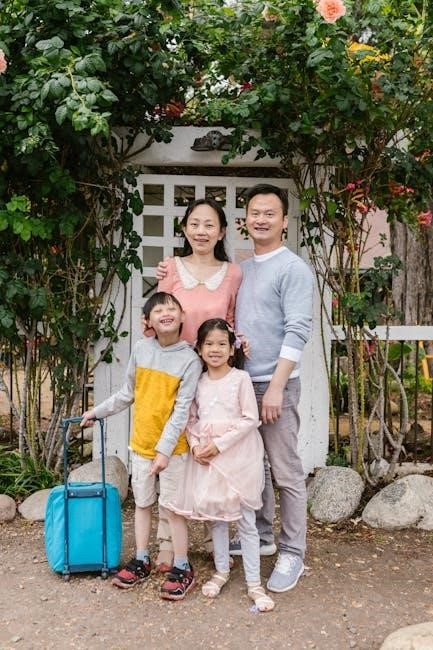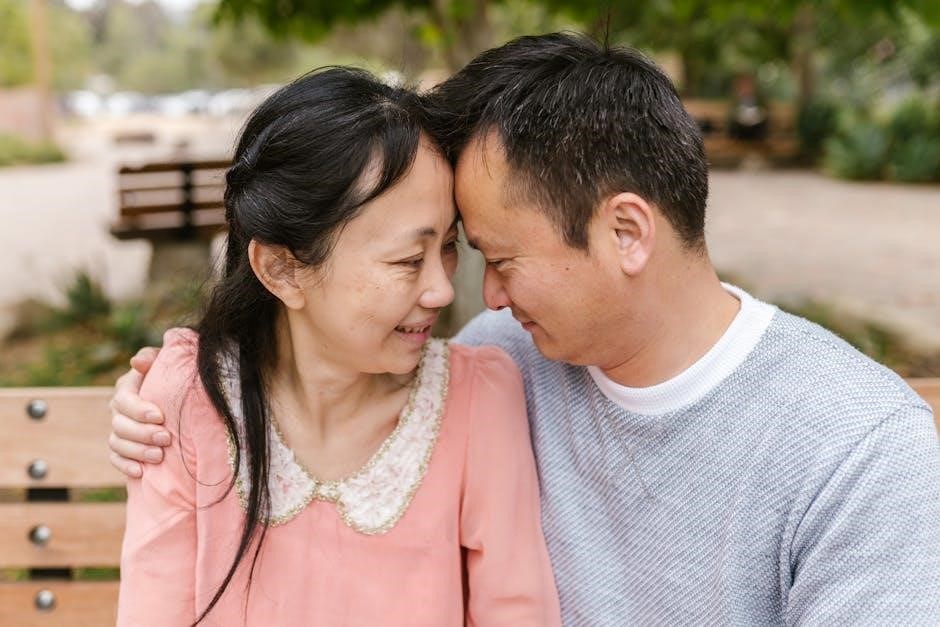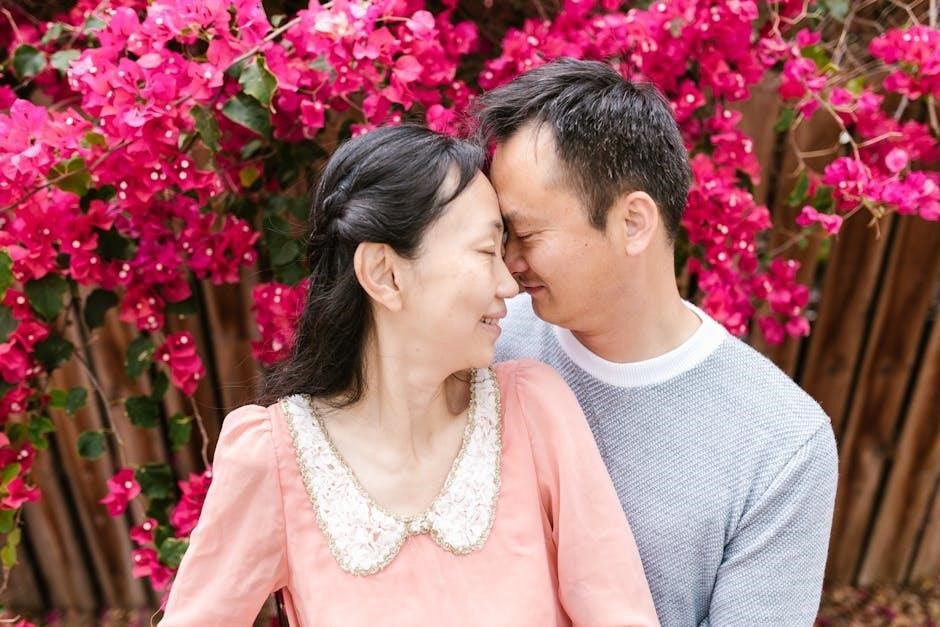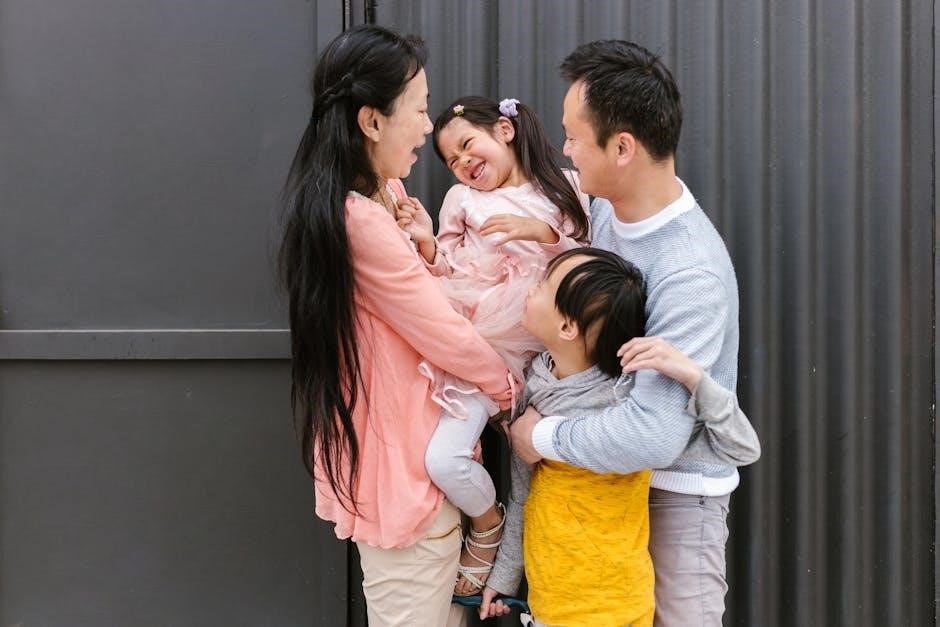Navigating ADHD in couples requires understanding its unique challenges and opportunities. This guide offers strategies to rebuild trust, reduce conflict, and foster intimacy, helping couples thrive together.
Overview of the Challenges and Opportunities
Couples affected by ADHD often face challenges like emotional dysregulation, communication gaps, and routine disruptions. However, these challenges also present opportunities for growth. By implementing tailored strategies, couples can rebuild trust, enhance intimacy, and develop healthier conflict resolution skills. ADHD’s unpredictability can foster creativity and adaptability, allowing partners to strengthen their relationship. With the right tools and mindset, couples can transform obstacles into opportunities for deeper connection and mutual understanding, creating a more resilient and fulfilling partnership.
The Importance of a Proactive Approach
A proactive approach is essential for couples navigating ADHD challenges. By addressing issues before they escalate, partners can prevent misunderstandings and emotional overwhelm. Planning, open communication, and consistent effort help create a stable foundation. Proactive strategies foster accountability and reduce resentment, allowing both partners to thrive. This mindset encourages growth, strengthens the relationship, and builds resilience. Taking initiative together ensures that challenges are met with solutions rather than frustration, paving the way for a more fulfilling and harmonious partnership.

Understanding ADHD in the Context of Relationships
ADHD impacts relationships through challenges in communication, emotional regulation, and daily interactions. It requires both partners to adapt and understand how ADHD influences their connection and dynamics.
What ADHD Is and How It Impacts Daily Life
ADHD, or Attention-Deficit/Hyperactivity Disorder, is a neurodevelopmental condition characterized by challenges with attention, impulsivity, and hyperactivity. It impacts daily life through forgetfulness, disorganization, and difficulty completing tasks. In relationships, ADHD can lead to misunderstandings, frustration, and feelings of neglect. Time management, emotional regulation, and maintaining focus during conversations become significant challenges. These issues can strain intimacy and communication, making everyday interactions more complex. Understanding ADHD’s effects is crucial for developing strategies to mitigate its impact and strengthen the relationship.
Common Misconceptions About ADHD in Couples
Many misconceptions surround ADHD in relationships, such as believing it’s simply about being disorganized or forgetful. Others assume ADHD only affects one partner or that it reflects a lack of effort or love. In reality, ADHD is a neurodevelopmental condition that impacts communication, intimacy, and daily interactions. It’s not just about one partner changing; both must adapt and collaborate. Understanding these myths is key to fostering empathy and developing effective strategies for a healthier relationship dynamic.

Communication Strategies for Couples with ADHD
Effective communication strategies for couples with ADHD include active listening, clear expression of needs, and structured discussions to reduce misunderstandings and strengthen the relationship.
Effective Communication Techniques
Effective communication techniques for couples with ADHD involve creating a safe, non-judgmental space for open dialogue. Active listening, emotional validation, and using “I” statements can reduce defensiveness. Setting clear agendas for conversations and practicing empathy helps both partners feel heard. Time-blocking discussions and using external reminders can prevent overwhelm. These strategies foster understanding, reduce misunderstandings, and strengthen the emotional connection, enabling couples to navigate challenges collaboratively and maintain a healthy relationship.
The Role of Active Listening and Empathy
Active listening and empathy are crucial in ADHD relationships, fostering a deeper emotional connection. By fully engaging with each other, partners can better understand perspectives, reducing misunderstandings. Empathy helps validate feelings, creating a safe space for open communication. These practices strengthen trust, allowing couples to navigate challenges collaboratively. Regularly practicing these skills can transform interactions, fostering a more supportive and understanding relationship dynamic.

Conflict Resolution and Disagreement
Conflict resolution in ADHD relationships requires proactive strategies to manage triggers and emotional reactivity. Open communication and mutual understanding help reduce misunderstandings and foster healthier disagreements.
Managing Triggers and Emotional Reactivity
Managing triggers and emotional reactivity is crucial for couples with ADHD. Recognizing personal triggers and developing coping strategies can prevent escalations. Techniques like mindfulness, deep breathing, and brief timeouts help regulate emotions. Open communication about triggers fosters understanding and reduces conflict. By addressing reactivity proactively, couples can create a calmer, more supportive environment, strengthening their relationship and improving conflict resolution. This approach encourages empathy and collaboration, leading to healthier interactions and emotional well-being for both partners. Implementing these strategies consistently can significantly enhance relationship stability and satisfaction, allowing both individuals to thrive together despite ADHD challenges.
Healthy Ways to Disagree and Resolve Conflicts
Healthy conflict resolution in ADHD-affected couples involves clear communication and empathy. Active listening, using “I” statements, and avoiding assumptions help prevent misunderstandings. Setting boundaries and taking breaks when emotions escalate can create space for calm reflection. Structured discussions, like writing down concerns before talking, can reduce impulsivity. Agreeing on solutions together fosters collaboration and mutual respect. These strategies promote understanding, reducing arguments and strengthening the relationship. By addressing conflicts constructively, couples can build trust and resilience, navigating challenges with unity and patience.

Building Intimacy and Emotional Connection
Nurturing intimacy involves creating rituals for emotional support, fostering empathy, and prioritizing quality time together. These practices help counterbalance challenges posed by ADHD, strengthening the bond.
Nurturing Intimacy in the Midst of Chaos
Nurturing intimacy amidst chaos requires intentional effort. Couples can create meaningful moments through scheduled date nights, surprise gestures, and mindful communication. These practices help maintain emotional closeness, even when life feels overwhelming. By prioritizing shared activities and expressing appreciation, partners can strengthen their connection and build resilience against ADHD-related challenges. Consistency and creativity are key to fostering intimacy in hectic environments, ensuring the relationship remains a source of comfort and joy.
Creating Rituals for Emotional Support
Establishing daily rituals fosters emotional connection and stability. Simple practices like a morning greeting, shared meals, or bedtime routines provide consistency. These moments help partners feel seen and supported, countering ADHD-related challenges. Regular check-ins or gratitude exchanges can deepen understanding and empathy. Consistency is key, as it creates a sense of predictability and comfort. Over time, these rituals strengthen the bond, offering a foundation for mutual support and emotional well-being in the relationship. They become anchors of connection in chaotic times.

Practical Tools and Systems for Daily Life
Shared calendars, task lists, and digital reminders help couples stay organized. Consistent routines and clear communication reduce chaos, fostering accountability and harmony in managing ADHD together effectively.
Creating a Daily Routine That Works for Both Partners
Establishing a structured daily routine is key for couples impacted by ADHD. Collaborate to create a shared schedule, ensuring tasks are divided fairly and responsibilities are clear. Use visual tools like calendars or charts to maintain accountability. Incorporate time blocks for work, leisure, and personal space. Regularly review and adjust the routine to accommodate changing needs. Consistency helps reduce chaos, while flexibility allows for adaptability. Open communication ensures both partners feel heard and supported in maintaining the routine.
Using Technology and Reminders to Stay Organized
Technology and reminders are powerful tools for couples navigating ADHD. Shared digital calendars, reminders, and task management apps help track responsibilities. Set recurring alerts for daily tasks and deadlines. Voice assistants can provide hands-free reminders. These tools reduce forgetfulness and create a sense of accountability. Customize notifications to suit individual needs, ensuring both partners stay informed. Regularly sync and review tasks to maintain clarity. Technology fosters organization, helping couples manage time effectively and reduce stress in their daily lives.

Therapy and Professional Support
Couples therapy and professional guidance are crucial for ADHD relationships. Trained therapists offer tailored strategies to improve communication and reduce conflict, fostering a healthier partnership.

The Role of Couples Therapy in ADHD Relationships
Couples therapy plays a vital role in addressing ADHD challenges, offering tailored strategies to improve communication and emotional regulation. Therapists help partners understand each other’s needs, fostering empathy and collaboration. By creating a safe space for open dialogue, therapy enables couples to rebuild trust, reduce conflict, and strengthen intimacy. It equips them with tools to manage triggers and disagreements effectively, promoting a more balanced and fulfilling relationship dynamic.
Individual Therapy for ADHD Management
Individual therapy is crucial for managing ADHD symptoms and developing personalized coping strategies. It helps individuals identify triggers, improve focus, and enhance self-regulation. Techniques like mindfulness and cognitive restructuring empower those with ADHD to navigate daily challenges effectively. Therapy also addresses emotional struggles, such as frustration or low self-esteem, fostering resilience and self-awareness. By focusing on personal growth, individual therapy complements couples therapy, ensuring each partner understands their role in the relationship and applies strategies effectively for a harmonious partnership.

Building a Support Network
Building a support network is vital for couples with ADHD, involving community groups, support organizations, and engaging friends and family for mutual understanding and shared growth.
The Importance of Community and Support Groups
Joining community and support groups provides a safe space for couples with ADHD to share experiences, gain insights, and connect with others facing similar challenges. These groups offer practical advice, emotional support, and a sense of belonging, helping both partners feel understood and empowered. Engaging with others who understand the unique dynamics of ADHD fosters resilience and strengthens relationships, creating a network of encouragement and shared growth.
Engaging Friends and Family in Your Journey
Involving friends and family in your ADHD journey can provide additional support and understanding. Educating them about ADHD helps reduce stigma and fosters a more supportive environment. Open communication about your needs and challenges allows loved ones to contribute positively, strengthening your relationship. By sharing your experiences, you create a network of empathy and encouragement, empowering both partners to thrive and grow together with the backing of those who care most.
Embrace ADHD as a shared journey, leveraging strategies from this guide to rebuild trust, reduce conflict, and foster intimacy. Continuous growth and proactive steps will lead to a thriving relationship.
Summarizing Key Strategies for Success
Rebuilding trust, reducing conflict, and fostering intimacy are cornerstone strategies. Couples should adopt proactive communication, emotional support, and organized routines. Therapy and community support can enhance understanding and growth, while empathy and patience are vital. By addressing ADHD’s impact together, couples can create a balanced and fulfilling relationship, turning challenges into opportunities for deeper connection and mutual support. Consistent effort and open dialogue are essential for long-term success.
Encouragement for Continuous Growth and Improvement
Embrace the journey of growth together, celebrating small victories and learning from setbacks. Patience and understanding are key to nurturing a resilient relationship. Seek inspiration from success stories and remind yourselves that progress, not perfection, is the goal. Relationships evolve, and so can yours. Stay committed to continuous learning and adaptation, fostering a future filled with connection, joy, and mutual support. Keep moving forward, knowing that every effort strengthens your bond and paves the way for a fulfilling tomorrow.
